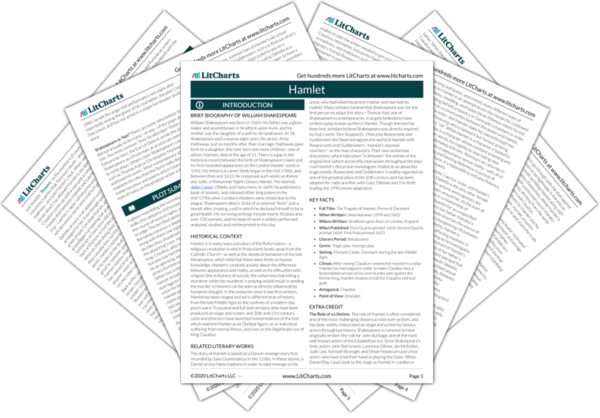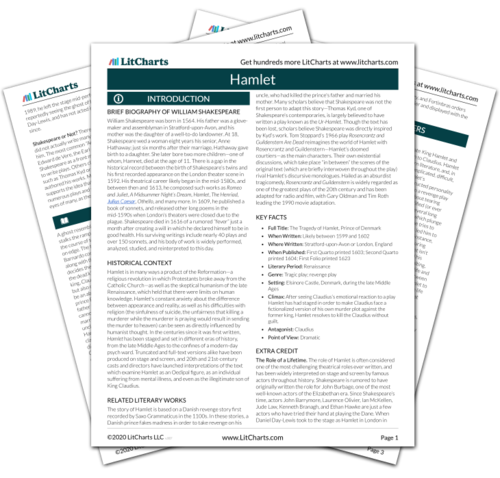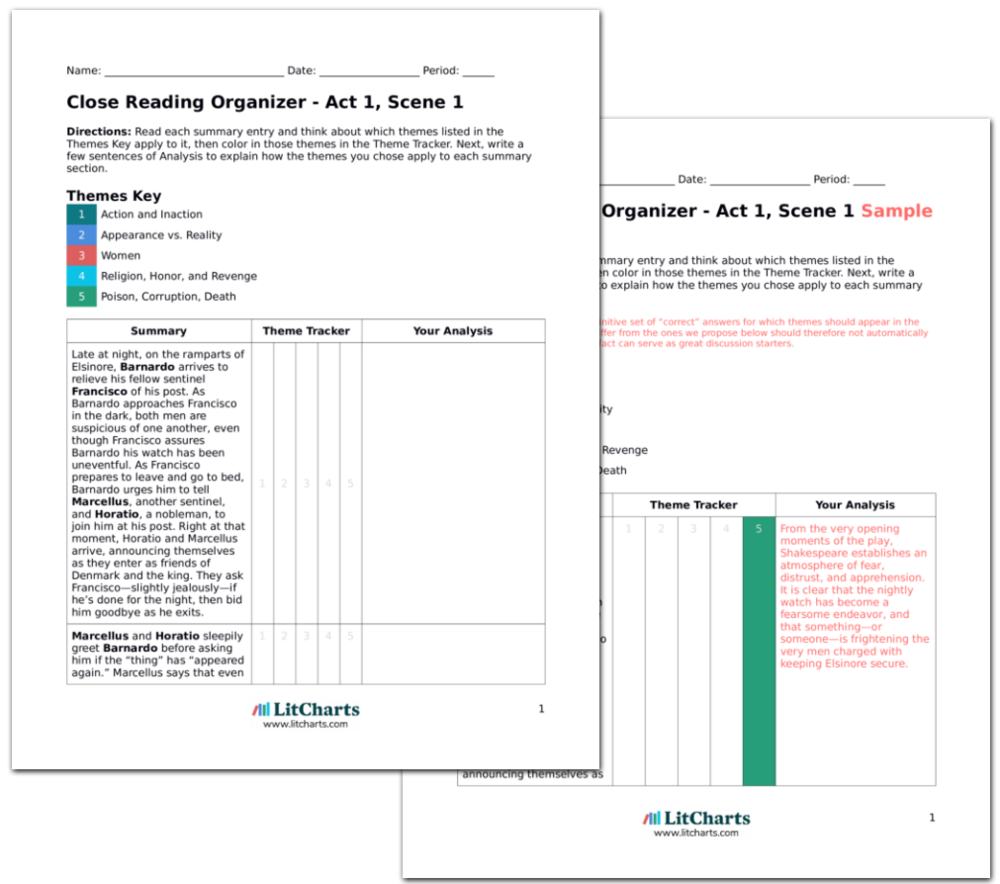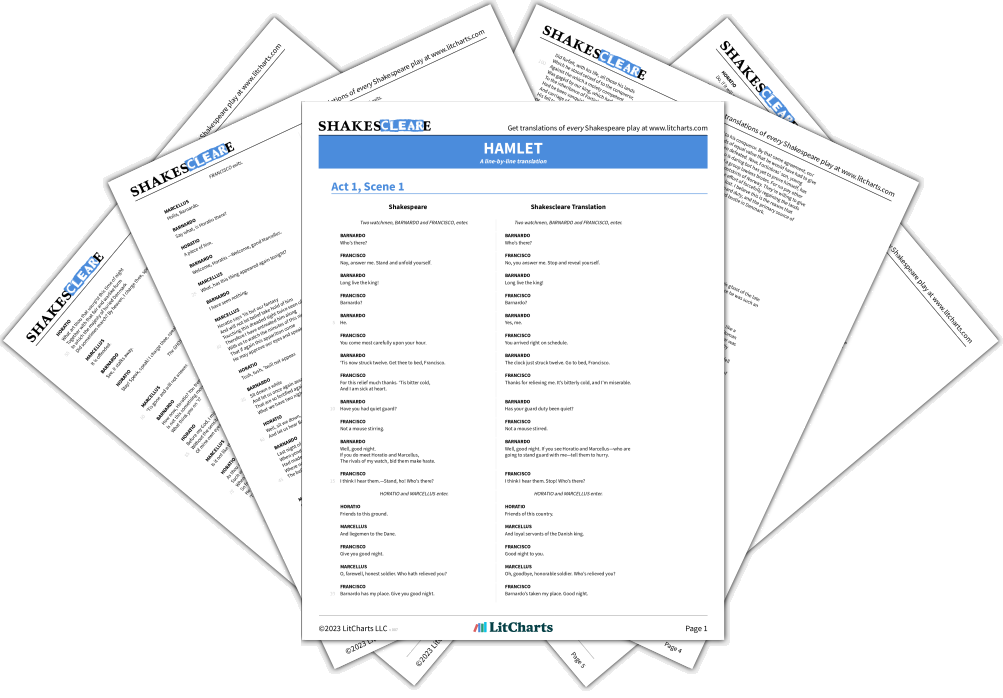![]()
LitCharts assigns a color and icon to each theme in Hamlet, which you can use to track the themes throughout the work.
![]()
![]()
![]()
![]()
![]()
Inside the walls of Elsinore, Claudius —the new king of Denmark—is holding court. With him are his new wife Gertrude , Hamlet’s mother and the queen; Hamlet himself; Claudius’s councilor Polonius ; Polonius’s children Laertes and Ophelia ; and several members of court. Claudius delivers a long monologue in which he laments the death of his brother, King Hamlet—but states that it is high time to move on and start focusing on the future. In this spirit, Claudius says, he has married his former sister-in-law Gertrude and become the new king. He tells the court that he is aware of Fortinbras ’s designs on Denmark but is not planning on kowtowing to the Norwegians’ demands—Claudius is determined to keep Denmark strong.
This scene shows how quickly everyone else at Elsinore has recovered from the former king’s death—everyone, that is, except for Hamlet. Claudius’s swift ascension to the throne—which has cut Hamlet’s place in line, so to speak—is indeed suspicious. Though Claudius has taken to his role like a fish to water, there’s something almost too perfect about his ease holding court, engaging in diplomatic matters, and serving as husband to his brother’s former wife.
Active Themes![]()
![]()
![]()
Two courtiers, Voltemand and Cornelius , enter the room to take a letter from Claudius . Claudius announces that he has written to the new King of Norway— Fortinbras ’s uncle, an “impotent and bedrid” man who has no idea of what his nephew is planning—to make sure that Fortinbras is put to a stop. Claudius charges Voltemand and Cornelius with hastily delivering the letter to the King of Norway. The courtiers leave, promising the demonstrate their loyalty through the speed of their journey.
Claudius wants to publicly demonstrate how well-prepared he is to handle any foreign threats—again, because the health of the nation is tied to the health of the king, Claudius wants to show that compared to “impotent” foreign leaders, he’s capable, decisive, and strong in body and mind.
Active Themes![]()
![]()
![]()
Claudius says that he knows Laertes has a request for him, and tells the young man to ask for anything he wishes— Polonius is so important to Claudius that Claudius will do whatever Laertes asks. Laertes asks the king’s permission to return to France. After making sure that Laertes has his father’s permission, as well, Claudius grants Laertes leave to go back to France.
There are complicated social codes at court which mirror the complex codes of religion, honor, and revenge which Hamlet will soon have to navigate.
Active Themes![]()
Claudius then turns his attention to his “cousin” and “son” Hamlet , asking why “the clouds [of grief] still hang” on him. Hamlet cheekily retorts that he is, on the contrary, “too much in the sun.” Gertrude speaks up and urges Hamlet to stop dressing in black and begin treating Claudius like a “friend” and father. It is “common,” Gertrude says, for loved ones to die. Hamlet stonily replies that “it is common.”
This passage introduces Hamlet as sulky and cheeky—but justifiably so in many ways. His comment that he is “too much in the sun” is a play on words which demonstrates how unhappy he is about Claudius’s marriage to his mother. “It is common” is another play on words which implies his mother’s marriage to Claudius is beneath her. Hamlet is angry that his mother has stooped so low as to marry her husband’s brother, and furious at the idea of being called Claudius’s son. He has no proof, at this point, of any violence or foul play—he has only his disgust for what he perceives as madness and disorder within his own family.
Active Themes![]()
![]()
![]()
"My students can't get enough of your charts and their results have gone through the roof." -Graham S.

Claudius speaks up and accuses Hamlet of mourning out of “impious stubbornness.” Such outward displays of grief, Claudius says, are “unmanly” and undignified. Claudius echoes Gertrude , assuring Hamlet that death is normal, and to mourn it so is a kind of crime against nature. He urges Hamlet to stay in Denmark as a high-ranking member of court rather than return to Wittenberg to resume his studies. Gertrude, too, begs Hamlet to stay. Hamlet replies to Gertrude that he will obey her. Claudius remarks upon how wonderful it is that Hamlet has chosen to stay, and asks Gertrude to come drink with him in celebration. Claudius, Gertrude, and the other members of court all exit to go be merry—except Hamlet, who stays behind.
Everyone wants to move on from the death of the king and walk forward into a new era—but Hamlet is unable to stop mourning his father, even as his “new” father tries to tell him how unbecoming (and emasculating) such persistent sadness is. Hamlet has no interest in revelry or togetherness—he is completely isolated within his own grief. Hamlet has a depressive, ruminative personality to begin with—and things are only headed downhill as he is forced to confront and contemplate issues of mortality, evil, and vengeance.
Active Themes![]()
![]()
![]()
![]()
In a lengthy monologue, Hamlet laments how “weary, stale, flat, and unprofitable” life has become for him since his father’s death two months ago. He is furious that his mother has remarried so quickly and deems her new marriage to his father’s brother “incestuous.” Though Hamlet is tormented by the strange twists and turns his family’s lives has taken, he knows he must “hold [his] tongue” and not make any trouble.
Hamlet is clearly in a state of agony over what to do. He knows he cannot submissively accept the current state of affairs, but isn’t sure how he can change the events that have recently taken place within his fractured family.
Active Themes![]()
![]()
![]()
Horatio , Marcellus , and Barnardo enter and greet Hamlet . Hamlet clearly hasn’t seen Horatio, his friend from Wittenberg, in a while, and is surprised and overjoyed at the sight of him. He asks Horatio what he’s doing in Elsinore, and Horatio replies that he came to attend King Hamlet’s funeral. Hamlet retorts that if Horatio was here for the funeral, he must have seen the wedding, too. Hamlet again laments how quickly his mother remarried, and sadly states that the world will never again see a man like his father. Horatio states that he saw Hamlet’s father just last night.
Hamlet is eager to voice his displeasure over the current state of affairs at Elsinore to anyone who will listen. He makes his grievance known not just to Horatio, but the sentinels as well. Though Hamlet is indecisive and cannot yet make sense of how he should deal with his suspicions of Claudius, it’s clear he knows that something must be done to remedy the injustice of his father’s death.
Active Themes![]()
![]()
Horatio begins telling Hamlet about how a ghost which bears a striking resemblance to Hamlet’s father has appeared to Marcellus and Barnardo three nights in a row, and assures Hamlet that the men are correct in what they’ve seen. Hamlet is amazed by the news and asks to know more details about the ghost. The men tell him that the king was dressed in full armor—but had his visor up and looked very pale. Hamlet says he wants to join the men on their watch tonight, and thanks them for their friendship as they exit the room. Alone, Hamlet wonders what the ghost has to tell him—and whether it will bring word of “foul play” and “foul deeds.”
The sentinels’ description of the ghost looking “very pale” further suggests that something is wrong in Denmark. Not only has the ghost of the king come back—but it is looking ill, even as it is dressed for war. Its paleness hearkens to the Pale Rider, one of the biblical Four Horsemen of the apocalypse, who rides the horse of Death and thus serves as a symbolic omen of darkness and suffering. The ghost’s external appearance of sickness, then, signals a parallel sense of social disease and political decay within the kingdom.
Active Themes![]()

“Would not have made it through AP Literature without the printable PDFs. They're like having in-class notes for every discussion!”
Get the Teacher Edition
“This is absolutely THE best teacher resource I have ever purchased. My students love how organized the handouts are and enjoy tracking the themes as a class.”
Hamlet in Plain English
“Every teacher of literature should use these translations. They completely demystify Shakespeare. Students love them!”
Copyright © 2024 All Rights Reserved Save time. Stress less.AI Tools for on-demand study help and teaching prep.
 Quote explanations, with page numbers, for over 44,324 quotes.
Quote explanations, with page numbers, for over 44,324 quotes. PDF downloads of all 2,003 LitCharts guides.
PDF downloads of all 2,003 LitCharts guides. Expert analysis to take your reading to the next level.
Expert analysis to take your reading to the next level. Advanced search to help you find exactly what you're looking for.
Advanced search to help you find exactly what you're looking for.
 Expert analysis to take your reading to the next level.
Expert analysis to take your reading to the next level. Advanced search to help you find exactly what you're looking for.
Advanced search to help you find exactly what you're looking for.